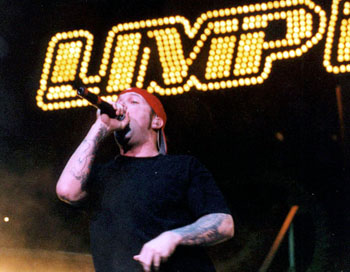![[Metroactive Music]](/music/gifs/music468.gif)
[ Music Index | San Jose | Metroactive Central | Archives ]
 The End of Pop Will music ever feel right again? By Gina Arnold FOR SOME REASON, I have always had a penchant for witty clothing--plastic platforms, furry miniskirts--even now I wear a hat with ears. I had almost grown out of it, but the world of baby clothes is rife with whimsy and having a baby put me right back there. Recently I was rifling a rack of such things, and was unaccountably attracted to a particular item. "Do you think it would be in poor taste to put the kid in a sleeper covered with pictures of 747 jets?" I asked my companion, holding said item up for inspection. "Or would it be, you know, ironic, sort of nostalgic, a statement about courage?" "Irony is dead," my friend said. "And you can't be too careful. I think people would be shocked." I sighed and put the sleeper back on the rack. She's right. The time isn't right for whimsical clothing, even whimsical music, since most people's sense of humor seemed to have collapsed. Indeed, among the many strange things to have occurred in America in the wake of the terrorist attacks, perhaps one of the oddest was the widely circulated reaction of Clear Channel, the corporation that owns and programs over 1,000 U.S. radio stations. A few days after the collapse of the World Trade Center, the company allegedly sent out a list of over 150 songs which were to be banned from play--like "Imagine" by John Lennon, "Leaving on a Jet Plane" by Peter Paul and Mary, "Jet Airliner" by Steve Miller and "It's the End of the World As We Know It (And I Feel Fine)" by R.E.M. It turned out to be one of the many unconfirmed rumors racing around the Internet. Clear Channel never sent out the list; they announced later that they were leaving the decision of what to play to individual stations. The point still stands; despite calls of censorship, many people reluctantly agreed with the alleged bans. None of these songs are rude, vulgar, politically sensitive or a threat to national security. Instead, the quality that got them marginalized as "dangerous" songs is just that they make us all feel too sad. And that, in a nutshell, says a lot about these times, for of all the changes that have occurred in this national crisis, the most profound has been a change of heart. Everything that rock & roll represented--fun, frivolity, danger, sex, solace and strength--is inappropriate at this moment in time. For many decades, rock spoke for us, demanding truth, justice, freedom and even, on occasion (like during Live AID), money. It did so in jolly anthems, sung in 4/4 time. That's all very well when the listeners feel disengaged or superior to the subject at hand, be it starving Ethiopians or sad-eyed Viet Nam vets or brutalized Tibetan monks. Pop music is very much the product and the voice of capitalism, which may be why it's so hard to listen to today. Entertainment in general was small comfort--and surprisingly, this was something most people in America felt simultaneously, "America: A Tribute to Heroes" notwithstanding. As tasteful and as heartfelt as that telethon was, it did little to assuage my pain--and the sight and sound of Fred Durst, whose entire catalog of music is very much part of the problem--singing Pink Floyd's stoner anthem "Wish You Were Here" merely added to it. I'm not blaming Limp Bizkit songs like "Break Stuff" for the decline of Western civilization, but they're definitely a symptom rather than a solution. Frankly, a world where pop music could feed the hungry and cloth the poor, where emotion can be turned into cold hard cash, is no longer viable--and probably never was. [ San Jose | Metroactive Central | Archives ]
|
From the October 4-10, 2001 issue of Metro, Silicon Valley's Weekly Newspaper.
Copyright © 2001 Metro Publishing Inc. Metroactive is affiliated with the Boulevards Network.
For more information about the San Jose/Silicon Valley area, visit sanjose.com.